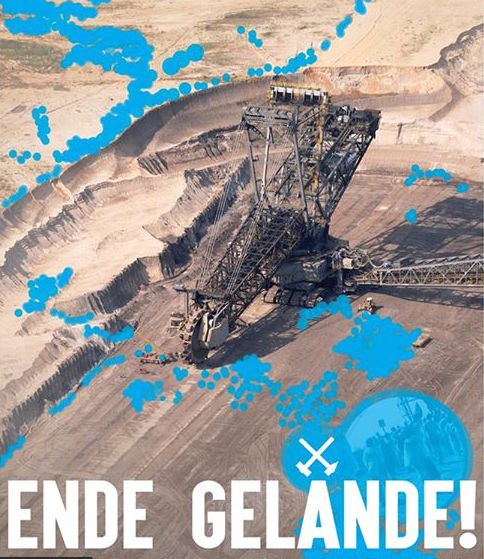 This summer, a mass act of civil disobedience will bring the diggers in the Rhineland coalfields – Europe’s biggest source of CO2 – to a halt. We talked to Martin Weis, who is involved in the grassroots coalition Ende Gelände that is organising the action.
This summer, a mass act of civil disobedience will bring the diggers in the Rhineland coalfields – Europe’s biggest source of CO2 – to a halt. We talked to Martin Weis, who is involved in the grassroots coalition Ende Gelände that is organising the action.
This summer, Ende Gelände is organising a mass action to stop the diggers in the Rhineland coalfields. What exactly is going to happen?
Martin: Hundreds of people will enter one of the open-pit lignite mines near Cologne in an act of civil disobedience. Down there – the holes are up to 200m deep and several kilometers wide – we’ll walk towards the excavators and they will have to stop their work. This way we will effectively shut down the mine – at least symbolically for a day or so.
Tell us why you got involved with Ende Gelände.
Martin: Coal and especially lignite is one of the main drivers of global warming. The coalfields in the Rhineland and the coal-fired power plants around those, make this region the largest emitter of CO2 in all of Europe.
In Germany for one we don’t need lignite coal anymore. We could start phasing it out right now and switch to 100% renewable energies. But the political processes are slow and hampered by the strong influence of the coal lobby. Ende Gelände helps nudge things along a bit.
There are many ways to oppose coal. Why do you think it takes civil disobedience?
Martin: Right now we are headed for a global temperature rise of 4°C. That would mean catastrophic climate change. Even now livelihoods are destroyed by droughts or floods, especially in the global south, and climate change will be a catalyst for even more of that. Combating climate change is obviously not just an environmental concern, but one of global justice.
The magnitude of the problem requires us to weigh our priorities. Do we want to try everything in our power to prevent catastrophic climate change or do we stop dead as soon as we see a ‘no trespassing’-sign? Civil disobedience is a legitimate and appropriate part of our diverse strategies as a climate movement.
Who can participate in the action and what are the risks involved?
Martin: We want to empower everyone who wants to be part of the action to protest in a way they feel comfortable with. Our main targets are of course the excavators and to get to them it is necessary to enter the mine. For those who want to show their solidarity, there will also be a legally authorised and family-friendly demonstration close to the mine.
Entering the mine involves some risks, this is after all a devastated moonscape most suitable for heavy machinery. Safety for all participants is our absolute priority. We urge everyone to prepare for the action by organising in groups and taking part in trainings. Directly before the action, which will take place from 14 to 16 August, a climate camp and degrowth summer school will take place in the region as well. Those are great opportunities to meet up, get some new input and enjoy summer. For internationals, they are also the easiest way to take part in a training for the action.
How can people get involved?
Martin: We want to make this big, so the first thing is to tell all your friends about it and spread the word about the action in your networks. We have our campaign materials translated into French and English. Order your packet of materials now and plaster your town, university and neighbourhood in Ende Gelände materials. You can also declare your intention to participate in the action on our website to show that lots of people support the action.
Finally, what does Ende Gelände actually mean?
Martin: It translates into ‘end of the line’ or ‘this far and no further’. The excavators have eaten up town after town, kilometer after another and polluted our atmosphere with greenhouse gases. That has to stop now.
Thank you, Martin. See you in the Rhineland!
If you’d like to find out more about the action and how you can take part, sign up here. 350 will share information from the organisers of Ende Gelände.